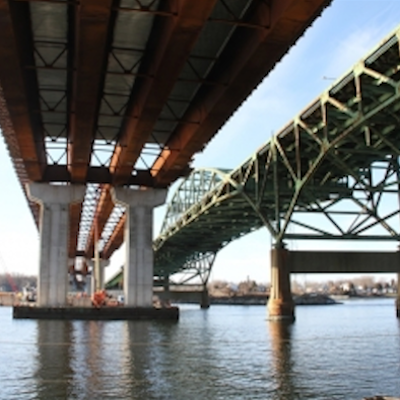Blais: Green Energy - More than Just “Food for Thought”
Thursday, March 20, 2014
Rhode Island's representatives had a wonderful opportunity recently, to gain the perspective of national leaders. John Kennedy, Senior VP from CVS and Aaron Renn, entrepreneur and publisher of Urbanophile.com spoke at the House economic workshop. John Kennedy offered his insight on why " people just aren't thinking about RI " when it comes time to expand or locate a business. Mr. Kennedy told them that RI's high cost of energy is on a list of one of the top 4 reasons.
So why, then, does our General Assembly insist on putting forth legislation that only promises to significantly increase the burden of high energy costs here in the state. Last week, Senator Sosnowski's bill (S 2690) was heard in committee. She, along with Senators Walaska, Conley, Cool Rumsey and Bates, believe it will be in Rhode Island's best interest to increase the mandate for utility companies to purchase more of their electricity from renewables - which would be a good move if the cost of renewables were competitive. However, it's not. The state forces National Grid to make these purchases even though they cost significantly more than what the average rate is for gas or coal generated electricity. The Senators' bill refers to 15-20 year permanent tariffs to finance renewable energy. This increased cost is ultimately borne by the ratepayer.
Some light reading.
GET THE LATEST BREAKING NEWS HERE -- SIGN UP FOR GOLOCAL FREE DAILY EBLASTHave you seen the recent report, distributed by the RI Center for Freedom and Prosperity (in conjunction with the Beacon Hill Institute), that reviewed the economic impact of the renewable energy mandates already in existence? Under the mandates that are already contained in Rhode Island law, the study shows that, in just 6 short years, by 2020, the current mandates will have a detrimental effect on employment, will reduce disposable income, will decrease private investment in the state and will increase the cost of energy not just for households, but for business and industry. This seems to be diametrically opposed to what our elected leadership claims it wants to do in the current economy.
Even more importantly, because DeepWater Wind is not up and running yet, the conclusions of this report do not consider the impact that the estimated $350 - $500 million cost will have on Rhode Island ratepayers. DeepWater Wind alone will have a significant, detrimental effect on RI's economy. More lost jobs, because contrary to the claim of increased "green jobs", many reports cite that more jobs are lost in other industries than are offset by any new green jobs gained, and generally speaking, the majority of those new green jobs are temporary.
Take a look at the great green hope.
Even the great green hope, Germany, has a panel pushing to turn back the hands of time on green energy. Because of rising costs associated with an aggressive renewable energy program, Energy Minister Gabriel is recommending cutting the average subsidy for wind, solar and other renewable power sources. Chancellor Merkel agrees. According to 'The Economist' Germany's cost of electricity is rising as the 2000 law guarantees 20 years of fixed high prices for solar and wind producers (is that similar to Senator Sosnowski's 15-20 year permanent tariff?). The subsidy is costly. An average household now pays an extra $355 a year to subsidize renewables. Costs are increasing for companies and are making them less competitive with America. As disturbing as all of this is for an economy like RI's, the irony worth noting is the impact that moving to the costly renewables in Germany has had on the environment. Because wind and solar are so unpredictable, conventional power plants have had to remain in operation to ensure a continuous power supply. The green energy plan, known as Energiewend in Germany, has so far increased, not decreased greenhouse gas emissions!
The warning bell is sounded in Germany.
The former German Chancellor, Schroder, warns in his new book that the support for renewable energy through the electricity price will lead consumers, especially the ones near the bottom of the income scale, to eventually revolt and say "We can't afford this anymore”. Additionally, he writes that German companies are already reconsidering plans to build plants in Germany, and are considering setting up in low-price-energy locations instead. Sound familiar?
But if mandates for renewables and higher utility bills aren't enough, there's more green legislation.
Visualize the speck of Rhode Island superimposed on a map of the US, contiguously aligned with China and India. Then consider population - Rhode Island's population of 1 million (give or take) compared to the combined 3 billion of the US, China and India. Do you have the image of a speck in the universe? That is what RI's relative effect on worldwide climate change looks like when trying to regulate carbon emissions here in Little Rhody.
Death by bureaucracy.
Last week Representative Handy introduced a 23 page piece of legislation (H 7904) to hold back the tide. Representative Handy, along with Representatives Ruggiero, Walsh, Keable and Naughton believe that the pinprick on the map known as Rhode Island, can make a dent in the impact that climate change is theoretically having on the world. Handy was quoted as saying that this bill would "bring more certainty to families and businesses that their homes and investments are safer here than elsewhere". We wonder what households really think of legislation that would significantly add to the cost of their monthly bill by mandating a target of 25% renewables by 2025, up from the current 16% by 2019. Or how businesses would respond to building code regulations that mandate "climate change mitigation through reduced energy consumption" with targeted reductions in greenhouse gas emissions, in both existing and new buildings, to be 50% below 1990 levels in just 20 years and reduced 85% by 2050. Gulp.
Alternatively known as "The Climate Change Adaption and Mitigation - Resilient RI Act of 2014", the name alone should be enough to make every RI taxpayer and businessman shake in their shoes. This bill cites the "rising sea levels" and the "more intense storms driving worsening floods", along with "measurably longer and hotter summers and heat waves" and "increasingly damaging coastal storms" as the premise for increasing the power and authority of 36 state departments, offices, commissions, councils, agencies and instrumentalities and creating a new Climate Change Science Advisory Council and a new Climate Change Adaptation Planning and Implementation Coordination Committee. All of this in addition to the existing State Planning Council, RI Greenways Council, RI Office of Energy Resources, and the RI Energy Efficiency and Resources Management Council. Of course, all of this will be coordinated with the now defunct Economic Development Corporation (EDC), currently known as the RI Commerce Corporation. A lot of bureaucracy, but to what end?
An Octopus only has 8 tentacles.
Then there's the "guidelines" to be developed by the Public Finance Management Board for use by the state and municipalities with their myriad departments, agencies, authorities and other bureaucracies, all for the purpose of considering the effects of climate change on any asset financed through the issuance of bonds. These guidelines will also be used by the Chair of the House and Senate Finance Committees, the Committee on Municipal Government and the House and Senate fiscal advisor.
How much would all of this cost and what would be the impact on RI's economy?
While the RI Center for Freedom and Prosperity has begun modeling the effect of mandating the reduction of carbon emissions and the increased usage of renewables, OSTPA has reviewed the state legislative website and cannot find any evidence of modeling that has been performed by the legislators proposing the bills. Perhaps it is a work in progress. Calculating an estimate of the impact on Rhode Island is necessary to make a determination as to whether the cost of implementing such sweeping change is offset by the benefits to Rhode Island.
So what will Rhode Island's leaders do in the face of a national perspective?
When CVS' Mr. Kennedy noted the top four issues that companies look at when determining where to locate their business, they were nothing different from what RI's own local economists, economic advisors and taxpayer groups have been focusing on for years - the state's fiscal stability (ie. employment and long-term budget projections), the cost of doing business (the tax burden, the regulatory environment and the cost of energy), the quality of the work force, and the infrastructure. At the end of the economic workshop, House Speaker Fox said the workshop offered "food for thought". Mr. Kennedy made it clear, that from a national business perspective, when companies have a choice to locate anywhere in the country, RI is not even 'food for thought'. Will making RI a leader in carbon emission reduction, at the expense of increasing the cost of living and doing business here, create an environment where companies want to expand or relocate?
Just think about the lack of interest in the I-195 land development on display recently and the answer for Rhode Island's leaders becomes crystal clear.
Lisa Blais is a board member of OSTPA, a taxpayer advocacy organization in Rhode Island.
Related Slideshow: The Ten Biggest Issues Facing the RI General Assembly in 2014
Related Articles
- Blais: Partisan Politics or Thoughtful Party-Spirited Proponents?
- Lisa Blais: No Public-Private Deals For Superman Building
- Lisa Blais: State Government Exasperates RI Taxpayers
- Blais: RI’s Leaders Need an “Ah-Ha” Moment Soon for the Economy
- Lisa Blais: Providence Goes After Water, Homeowners To Fix Budget
- Lisa Blais: The Governor’s Executive Order and Your Wallet
- Lisa Blais: Are RI Legislators Working for You?
- Lisa Blais: RI Needs to Oppose Binding Arbitration Bill
- Lisa Blais: The Struggle To Retain Seniority For Teachers
- Lisa Blais: Awakening The Sleeping Giant in Coventry & Elsewhere
- Lisa Blais: RI Needs to Rise Above Sexy, Gossipy + Juicy Politics
- Lisa Blais: Third Rail of Politics – Public Sector Unions
- Lisa Blais: Big Labor Wants To Shuffle The Deck On Obamacare
- Lisa Blais: RI’s Budget—State Pension, Tolls + The Big Win
- Lisa Blais: Who Will Actually Benefit From RI’s Health Exchange?
- Lisa Blais: Education Is Rhode Island’s Political Football
- Lisa Blais: RI’s Economic Assault On Average Taxpayers
- Lisa Blais: Will 2014 Be Better Than 2013?
- Lisa Blais: Election Cycle: Pandering to Taxpayers
- Lisa Blais: RI’s Obamacare Landscape: Got Coverage?
- Lisa Blais: Will RI Move Forward?
- Lisa Blais: Money Flows To Campaigns + Cuts Off Kids
- Lisa Blais: Rhode Island School Choice A Travesty




2013.png)








2013_80_80_c1.png)








